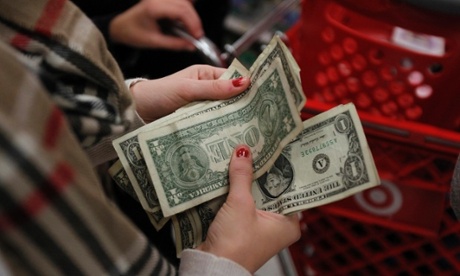
Got a “meh” gift this holiday? Forget re-gifting. Return it.
That seems to be the thinking for an increasing number of Americans. This year, US retailers expect that about $64.67bn in gifts will be returned. More than one fifth of all returns take place over the holidays, according to the National Retail Federation 2014 survey.
Yet it’s not the return of the unwanted gifts that troubles retailers. It’s the return fraud – return of stolen merchandise – that costs them $10.9bn a year. This holiday season alone, US retailers are set to lose $3.58bn on such fraudulent returns.
Returns aren’t all bad for the industry – especially if they take place inside the actual store. As people are in the store, those who are there to return gifts might end up splurging on themselves. Eight in 10 shoppers were planning to take advantage of the year-end-sales and more than half of them were planning to spend about $160 on themselves, RetailMeNot found.
Individual shoppers are usually not the culprit when it comes to such scams. An increasing number of these returns are carried out by organized crime groups, says Bob Moraca, the National Retail Federation vice president of loss prevention.
“Return fraud has become an unfortunate trend in retail thanks to thieves taking advantage of retailers’ return policies to benefit from the cash or store credit they don’t deserve,” Moraca said. “Many of these return fraud instances are a direct result of a larger, more experienced crime rings that continue to pose serious threats to retailers’ operations and their bottom lines.”
More than 78% of US retailers were targeted by these crime rings in 2014, up from 60.3% in 2013, according the federation’s survey.
Despite the fraudulent returns, 70% of the retailers do not plan to change their return policy this year.
That seems to be the thinking for an increasing number of Americans. This year, US retailers expect that about $64.67bn in gifts will be returned. More than one fifth of all returns take place over the holidays, according to the National Retail Federation 2014 survey.
Yet it’s not the return of the unwanted gifts that troubles retailers. It’s the return fraud – return of stolen merchandise – that costs them $10.9bn a year. This holiday season alone, US retailers are set to lose $3.58bn on such fraudulent returns.
Gift returns: where cash is king
Few Americans actually admit to returning their gifts. Thirty-two percent of shoppers say they have returned a holiday gift, according to a survey by RetailMeNot. When they do, 40% of them prefer to swap them out for cash. Just 16% want to swap out their unwanted gifts for gift cards, 13% for other items and 11% for store credit.Returns aren’t all bad for the industry – especially if they take place inside the actual store. As people are in the store, those who are there to return gifts might end up splurging on themselves. Eight in 10 shoppers were planning to take advantage of the year-end-sales and more than half of them were planning to spend about $160 on themselves, RetailMeNot found.
Grinch, the retail edition
Talk about stealing presents. The National Retail Federation estimates that about $3.58bn of holiday returns are fraudulent – items that were either stolen from the store and then returned, or were paid for with fake or stolen credit cards and then returned.Individual shoppers are usually not the culprit when it comes to such scams. An increasing number of these returns are carried out by organized crime groups, says Bob Moraca, the National Retail Federation vice president of loss prevention.
“Return fraud has become an unfortunate trend in retail thanks to thieves taking advantage of retailers’ return policies to benefit from the cash or store credit they don’t deserve,” Moraca said. “Many of these return fraud instances are a direct result of a larger, more experienced crime rings that continue to pose serious threats to retailers’ operations and their bottom lines.”
More than 78% of US retailers were targeted by these crime rings in 2014, up from 60.3% in 2013, according the federation’s survey.
Despite the fraudulent returns, 70% of the retailers do not plan to change their return policy this year.










0 comments:
Post a Comment